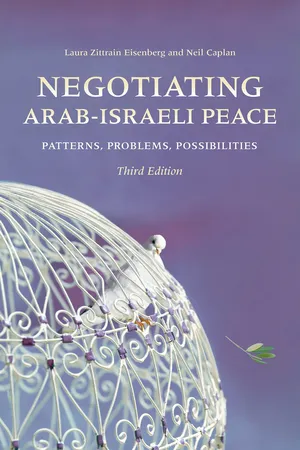
Negotiating Arab-Israeli Peace
Patterns, Problems, Possibilities
- English
- ePUB (mobile friendly)
- Available on iOS & Android
Negotiating Arab-Israeli Peace
Patterns, Problems, Possibilities
About this book
Fifteen years since the publication of its second edition, this foundational text in the history of Arab-Israeli peacemaking endeavors has been updated to include developments from the past twenty-five years.
Thoroughly revised and expanded, the third edition of Negotiating Arab-Israeli Peace examines the history of recurrent efforts to resolve the Arab-Israeli conflict since the 1970s and identifies a pattern of negative negotiating behaviors that repeatedly derail peacemaking efforts. In addition to updating all of the book's existing chapters with post-2010 sources and developments, authors Eisenberg and Caplan have added new chapters on the Arab Peace Initiative, the Annapolis Conference, the Kerry mission, and the Abraham Accords, as well as a conclusion that questions several core notions regarding the nature of the conflict, the possibility of its resolution, Arab-Israeli "normalization," and the viability of the two-state solution. An epilogue extends the book's framework into present-day crises in the region, specifically Hamas's 7 October 2023 attack on Israel and Israel's war against Hamas in Gaza. A companion website comprises nine appendices, among them 145 primary source documents, expanded notes, links to websites for maps, data and analysis, peace activities, and additional visual and documentary sources. Also online is a robust instructor's guide offering supplementary resources and ideas for assignments, research and classroom exercises, all of which draw upon and complement the themes running throughout the text.
By measuring contemporary diplomatic episodes against the historical pattern of counterproductive negotiating habits, Negotiating Arab-Israeli Peace makes possible a coherent comparison of some eighty years of Arab-Israeli negotiations and offers readers a framework with which to assess the relative strengths and weaknesses of peace-making attempts—past, present, and future.
Frequently asked questions
- Essential is ideal for learners and professionals who enjoy exploring a wide range of subjects. Access the Essential Library with 800,000+ trusted titles and best-sellers across business, personal growth, and the humanities. Includes unlimited reading time and Standard Read Aloud voice.
- Complete: Perfect for advanced learners and researchers needing full, unrestricted access. Unlock 1.4M+ books across hundreds of subjects, including academic and specialized titles. The Complete Plan also includes advanced features like Premium Read Aloud and Research Assistant.
Please note we cannot support devices running on iOS 13 and Android 7 or earlier. Learn more about using the app.
Information
Table of contents
- Cover
- Half-Title Page
- Title Page
- Copyright
- Contents
- List of Maps
- Preface to the Third Edition
- In-Text Abbreviations for Online Sources
- Introduction. Historical Patterns: Bad Habits Are Hard to Break
- Part 1. The Arab-Israeli Peace Process: Beginnings
- Part 2. The Arab-Israeli Peace Process: Madrid and After
- Part 3. The Israeli-Palestinian Peace Process: Oslo’s Rise and Fall
- Conclusion: A Perpetual Peace Process
- Epilogue: The 7 October 2023 Hamas Attack and Israel’s War against Hamas in Gaza
- Bibliography
- Index
- About the Authors